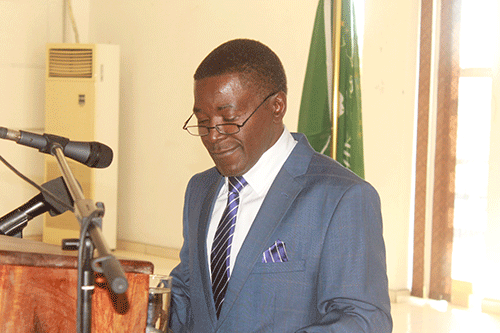RUNDU - Kavango East governor Bonifatius Wakudumo has commended the GIZ Farming for Resilience Project for initiating and supporting a workshop aimed at planting a seed of entrepreneurship in farmers in the Kavango East region.
The governor was peaking during the official opening of the two-week-long Farmers Business School (FBS) training of trainers workshop underway at Hotel Rundu.
The objective of the workshop is to capacitate trainers so they can train farmers on agripreneurship. GIZ Farming for Resilience Project initiated and is supporting the workshop by providing training manuals, posters and all material that are being used during the training of trainers and training of farmers.
The Farming for Resilience (F4R) project supports the Ministry of Agriculture, Water and Land Reform (MAWLR) in strengthening the resilience of the food sector in general, and the adaptation capacity to climate change among smallholder farmers in communal areas in particular.
“The Farmers Business School is a tested concept that was developed in 2010 as an innovative agricultural extension and training approach to promote entrepreneurship and business skills among smallholder farmers in Africa,” he said.
FBS is ultimately targeting value chain farmers in 10 regions namely, Kavango East, Kavango West, Kunene, Zambezi, Oshana, Ohangwena, Oshikoto, Omusati, Omaheke and Otjozondjupa regions.
“I regard Namibia being lucky to be added to other African countries to receive such capacity building intervention. This is a special occasion that marks a hallmark of farming community empowerment that will happen after this workshop,” Wakudumo noted.
The approach of the FBS builds on experiential learning and targets a mindset change among farmers to identify themselves as entrepreneurs and investors.
“This development is a crucial prerequisite for the adoption of improved agricultural techniques, the exploitation of new market opportunities and investments in agricultural production, which consequently lead to improved productivity and increased income,” the governor noted.
In combination with other advisory services, the FBS approach is recognised as an integrated cost-effective extension tool for the agricultural sector.
FBS is not in isolation but complements technical training and agricultural extension. Farmers – men and women – learn in farmers business schools how to plan their activities, how to target investments of labour, land and capital for better yield, quality, and the market for their produce.
Since 2010, FBS has been implemented in 24 countries in Africa and have an outreach that is exceeding 1.4 million smallholder farmers.
“I am very happy to see that in Namibia, FBS picked locally important value chains: pearl millet (mahangu), maize and chickens. Those are very important commodities in the communal areas in our regions and we need to enhance production and attach value to such products,” he said.
“I am reliably informed that in the next phase, all other regions will be covered because FBS will include other value chains such as livestock (cattle and goats) and fodder production,” he said.
“The government of the Republic of Namibia and our stakeholders such as GIZ Farming for Resilience realised and recognised the need for entrepreneurship in farming so that farmers are not only focusing on production but also to look at other important elements that can improve and commercialise farming,” he said.
Wakudumo further called upon beneficiary farmer trainers to grasp the knowledge and skills that will enable them to capacitate farmers that they will be training in different communities to improve their entrepreneurial skills.
The training of trainers will consist of an interactive exchange on business skills, related tools, the FBS training methodology combined with presentations, group work, practical exercises, and role-plays.
The future FBS trainers will get familiar with the approach through simulations of FBS training sessions, led by groups of trainers.
The evaluation of each simulation will enhance progressive improvement.
The first week will be devoted to learning facilitation and training techniques of adult learning, the introduction to farm management tools and the methods of calculation of these key tools by means of practical exercises.
The training shall also include the delivery of the 12 modules by the international master trainer and the national master trainer, complemented by simulations by the prospective FBS trainers.
- jmuyamba@nepc.com.na


